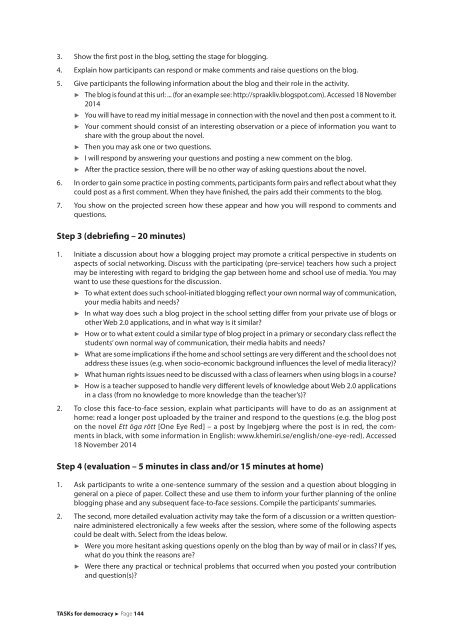TASKs for democracy
4NYw4W
4NYw4W
You also want an ePaper? Increase the reach of your titles
YUMPU automatically turns print PDFs into web optimized ePapers that Google loves.
3. Show the first post in the blog, setting the stage <strong>for</strong> blogging.<br />
4. Explain how participants can respond or make comments and raise questions on the blog.<br />
5. Give participants the following in<strong>for</strong>mation about the blog and their role in the activity.<br />
<br />
<br />
<br />
<br />
<br />
The blog is found at this url: ... (<strong>for</strong> an example see: http://spraakliv.blogspot.com). Accessed 18 November<br />
2014<br />
You will have to read my initial message in connection with the novel and then post a comment to it.<br />
Your comment should consist of an interesting observation or a piece of in<strong>for</strong>mation you want to<br />
share with the group about the novel.<br />
Then you may ask one or two questions.<br />
I will respond by answering your questions and posting a new comment on the blog.<br />
After the practice session, there will be no other way of asking questions about the novel.<br />
6. In order to gain some practice in posting comments, participants <strong>for</strong>m pairs and reflect about what they<br />
could post as a first comment. When they have finished, the pairs add their comments to the blog.<br />
7. You show on the projected screen how these appear and how you will respond to comments and<br />
questions.<br />
Step 3 (debriefing – 20 minutes)<br />
1. Initiate a discussion about how a blogging project may promote a critical perspective in students on<br />
aspects of social networking. Discuss with the participating (pre-service) teachers how such a project<br />
may be interesting with regard to bridging the gap between home and school use of media. You may<br />
want to use these questions <strong>for</strong> the discussion.<br />
<br />
<br />
<br />
<br />
<br />
<br />
To what extent does such school-initiated blogging reflect your own normal way of communication,<br />
your media habits and needs?<br />
In what way does such a blog project in the school setting differ from your private use of blogs or<br />
other Web 2.0 applications, and in what way is it similar?<br />
How or to what extent could a similar type of blog project in a primary or secondary class reflect the<br />
students’ own normal way of communication, their media habits and needs?<br />
What are some implications if the home and school settings are very different and the school does not<br />
address these issues (e.g. when socio-economic background influences the level of media literacy)?<br />
What human rights issues need to be discussed with a class of learners when using blogs in a course?<br />
How is a teacher supposed to handle very different levels of knowledge about Web 2.0 applications<br />
in a class (from no knowledge to more knowledge than the teacher’s)?<br />
2. To close this face-to-face session, explain what participants will have to do as an assignment at<br />
home: read a longer post uploaded by the trainer and respond to the questions (e.g. the blog post<br />
on the novel Ett öga rött [One Eye Red] – a post by Ingebjørg where the post is in red, the comments<br />
in black, with some in<strong>for</strong>mation in English: www.khemiri.se/english/one-eye-red). Accessed<br />
18 November 2014<br />
Step 4 (evaluation – 5 minutes in class and/or 15 minutes at home)<br />
1. Ask participants to write a one-sentence summary of the session and a question about blogging in<br />
general on a piece of paper. Collect these and use them to in<strong>for</strong>m your further planning of the online<br />
blogging phase and any subsequent face-to-face sessions. Compile the participants’ summaries.<br />
2. The second, more detailed evaluation activity may take the <strong>for</strong>m of a discussion or a written questionnaire<br />
administered electronically a few weeks after the session, where some of the following aspects<br />
could be dealt with. Select from the ideas below.<br />
<br />
<br />
Were you more hesitant asking questions openly on the blog than by way of mail or in class? If yes,<br />
what do you think the reasons are?<br />
Were there any practical or technical problems that occurred when you posted your contribution<br />
and question(s)?<br />
<strong>TASKs</strong> <strong>for</strong> <strong>democracy</strong> Page 144


